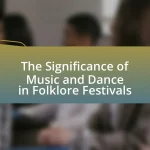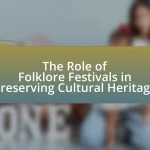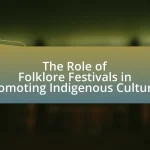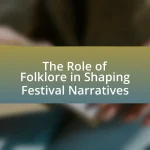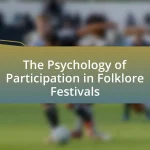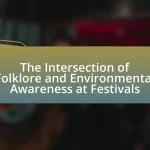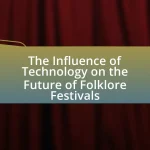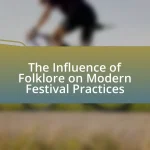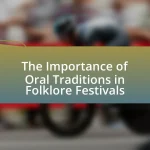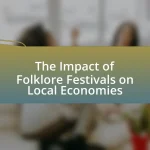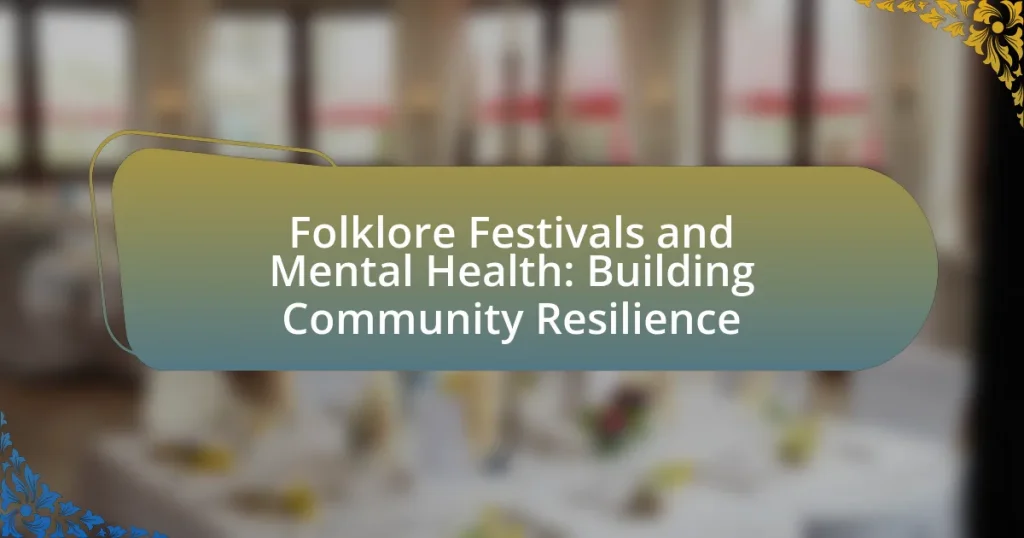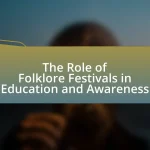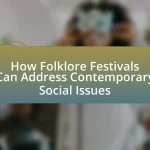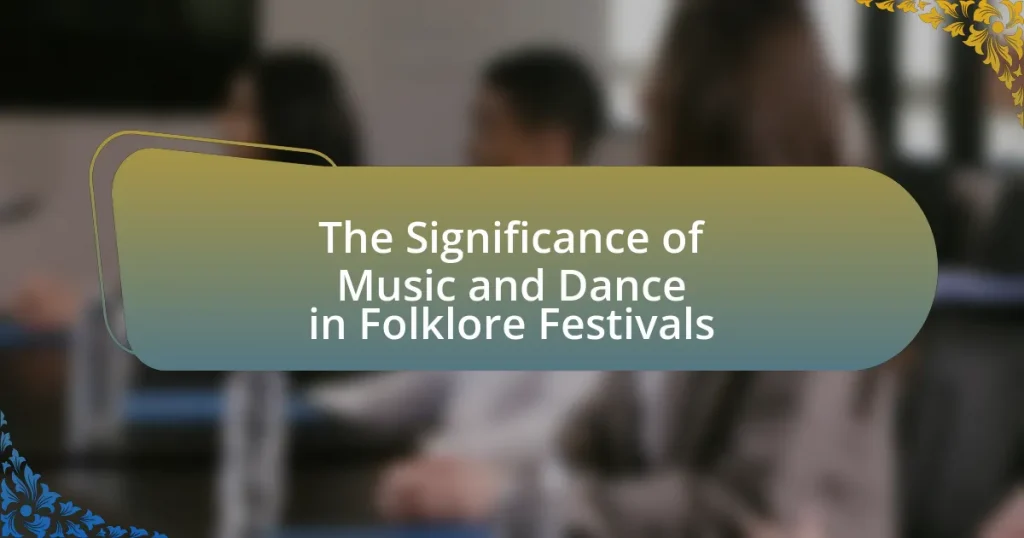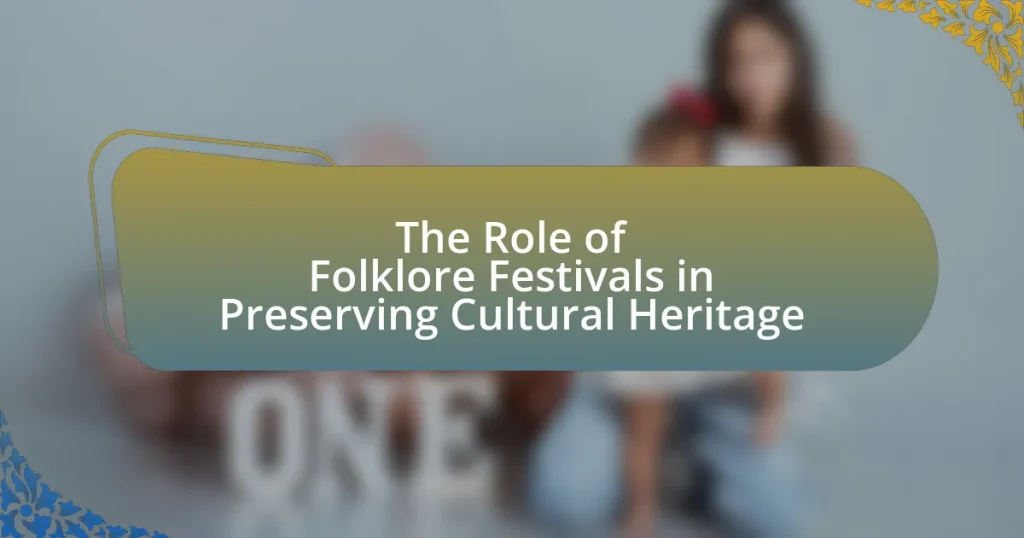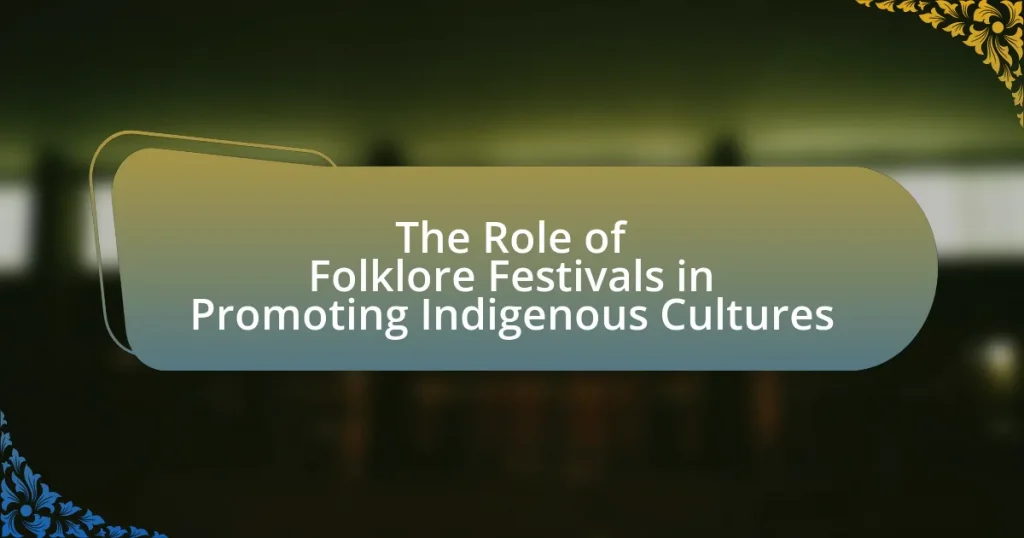Folklore festivals are cultural events that celebrate the traditions, stories, music, and arts of communities, playing a crucial role in fostering community identity and cohesion. These festivals enhance mental well-being by providing social support, reducing isolation, and promoting a sense of belonging. They contribute to cultural identity through the preservation of traditional practices and facilitate intergenerational knowledge transfer. Additionally, folklore festivals strengthen community resilience by enhancing social networks and cultural pride, while also offering psychological benefits such as improved mood and reduced anxiety. The article explores the significance of folklore festivals in promoting mental health and community engagement, highlighting best practices for organizing inclusive events that support mental well-being.
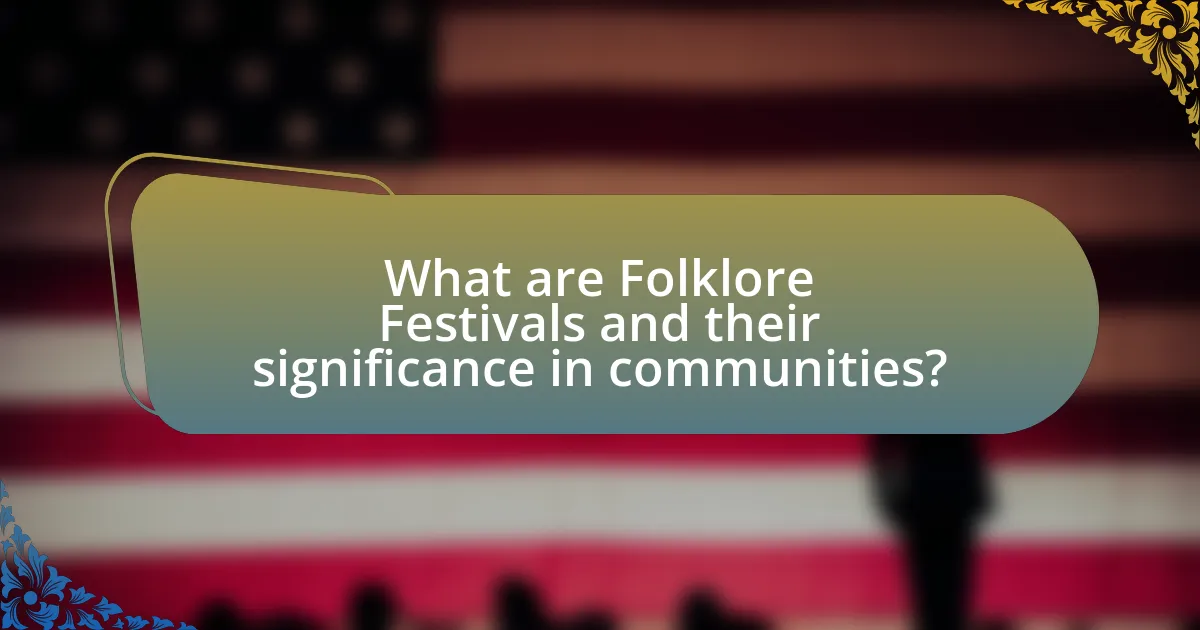
What are Folklore Festivals and their significance in communities?
Folklore festivals are cultural events that celebrate the traditions, stories, music, and arts of a community, often featuring performances, crafts, and food that reflect the local heritage. These festivals play a significant role in fostering community identity and cohesion by bringing people together to share and preserve their cultural narratives. Research indicates that participation in such communal activities can enhance mental well-being, as they provide social support, reduce feelings of isolation, and promote a sense of belonging. For example, a study published in the Journal of Community Psychology found that community engagement through cultural events positively impacts mental health by building resilience and social networks.
How do Folklore Festivals contribute to cultural identity?
Folklore festivals contribute to cultural identity by celebrating and preserving traditional practices, stories, and art forms that define a community’s heritage. These festivals serve as platforms for intergenerational knowledge transfer, allowing older generations to share cultural narratives and customs with younger members, thereby reinforcing a sense of belonging and continuity. For instance, events like the National Folk Festival in the United States showcase diverse cultural expressions, fostering pride and awareness of unique cultural backgrounds. This engagement not only strengthens individual and collective identities but also enhances community resilience by promoting social cohesion and mutual support among participants.
What elements define the cultural aspects of Folklore Festivals?
Cultural aspects of Folklore Festivals are defined by traditional music, dance, storytelling, crafts, and culinary practices that reflect the heritage of a community. These elements serve as a means of preserving cultural identity and fostering social cohesion among participants. For instance, traditional music and dance often showcase regional styles and historical narratives, while storytelling conveys moral lessons and community values. Crafts and culinary practices highlight local resources and skills, reinforcing a sense of belonging. The integration of these elements not only celebrates cultural diversity but also promotes mental well-being by enhancing community resilience through shared experiences and collective memory.
How do these festivals preserve traditional practices?
Festivals preserve traditional practices by actively showcasing cultural rituals, music, dance, and crafts that have been passed down through generations. These events serve as platforms for communities to engage in and celebrate their heritage, reinforcing social bonds and collective identity. For instance, many folklore festivals include traditional storytelling and performances that reflect historical narratives and local customs, ensuring that these practices remain relevant and appreciated in contemporary society. Additionally, participation in these festivals fosters intergenerational knowledge transfer, as older community members share their skills and stories with younger generations, thus maintaining the continuity of cultural traditions.
What role do Folklore Festivals play in community engagement?
Folklore festivals play a crucial role in community engagement by fostering social cohesion and cultural identity among participants. These events provide a platform for individuals to connect through shared traditions, stories, and performances, which enhances community bonds. Research indicates that participation in folklore festivals can lead to increased social interaction and a sense of belonging, contributing to overall mental well-being. For instance, a study published in the Journal of Community Psychology found that community festivals significantly improve residents’ perceptions of their neighborhood and encourage active participation in local initiatives.
How do these festivals foster social connections among participants?
Folklore festivals foster social connections among participants by creating shared experiences that encourage interaction and collaboration. These events often feature communal activities such as traditional dances, storytelling, and food sharing, which promote bonding among attendees. Research indicates that participation in such festivals enhances social cohesion, as individuals engage with one another in a festive atmosphere, leading to the formation of new friendships and strengthening existing relationships. For instance, a study published in the Journal of Community Psychology found that community events significantly increase social capital, which is essential for building resilient communities.
What activities promote community involvement during these festivals?
Activities that promote community involvement during folklore festivals include traditional performances, workshops, and local food markets. Traditional performances, such as music and dance, engage community members and encourage participation, fostering a sense of belonging. Workshops, which may include crafts or storytelling, provide hands-on experiences that allow individuals to connect with their cultural heritage and each other. Local food markets not only showcase regional cuisine but also support local vendors, enhancing community ties and economic resilience. These activities collectively strengthen social networks and contribute to mental well-being by creating shared experiences and a sense of community identity.
How can Folklore Festivals impact mental health and well-being?
Folklore festivals can significantly enhance mental health and well-being by fostering community connections and cultural identity. These events provide opportunities for social interaction, which is crucial for reducing feelings of isolation and loneliness. Research indicates that participation in community activities, such as folklore festivals, can lead to improved mood and decreased anxiety levels. For instance, a study published in the Journal of Community Psychology found that community engagement through cultural events positively correlates with psychological well-being, highlighting the role of shared experiences in promoting mental health. Additionally, folklore festivals often celebrate traditions and stories that reinforce cultural heritage, contributing to a sense of belonging and purpose, which are vital for overall mental wellness.
What psychological benefits are associated with attending Folklore Festivals?
Attending folklore festivals provides psychological benefits such as enhanced social connectedness, increased cultural appreciation, and improved mental well-being. These festivals foster community engagement, allowing individuals to form social bonds and support networks, which are crucial for mental health. Research indicates that participation in cultural events can lead to reduced feelings of isolation and increased feelings of belonging, as evidenced by a study published in the Journal of Community Psychology, which found that community events significantly enhance social cohesion and individual well-being. Additionally, engaging with cultural traditions can promote a sense of identity and purpose, further contributing to positive mental health outcomes.
How do these festivals provide a sense of belonging and support?
Folklore festivals provide a sense of belonging and support by fostering community engagement and cultural identity. These events create a shared space where individuals can connect over common traditions, enhancing social bonds and reducing feelings of isolation. Research indicates that participation in community festivals can lead to improved mental health outcomes, as they promote social cohesion and collective identity. For instance, a study published in the Journal of Community Psychology found that community events significantly increase feelings of belonging and support among participants, highlighting their role in building resilience within communities.
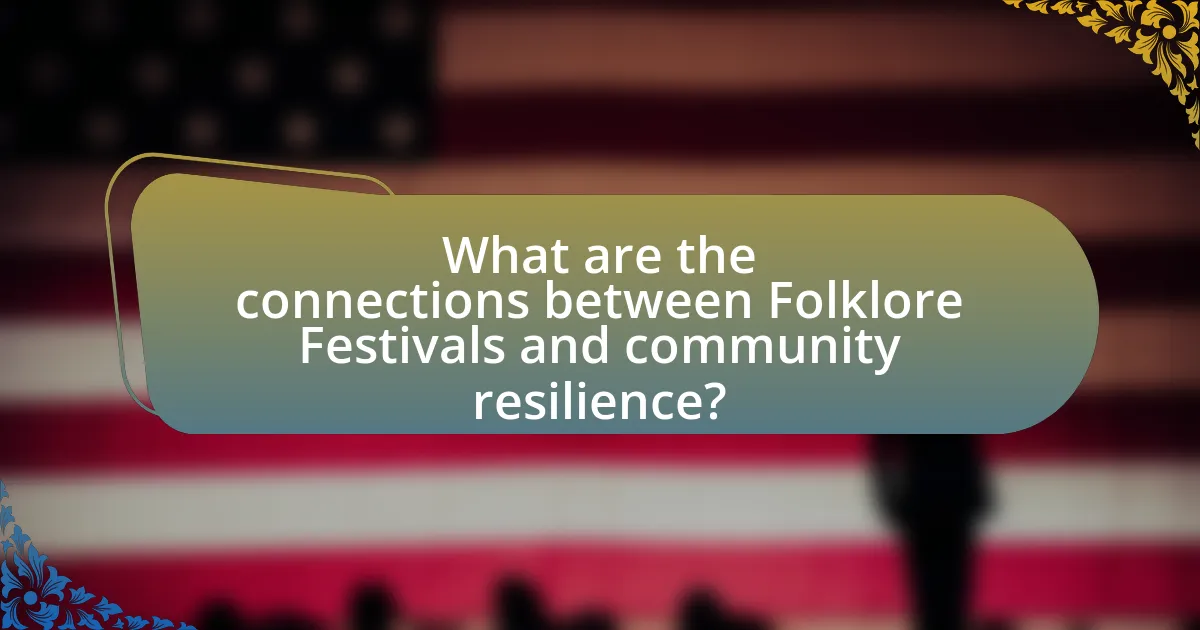
What are the connections between Folklore Festivals and community resilience?
Folklore festivals enhance community resilience by fostering social cohesion, cultural identity, and collective memory. These events bring together diverse groups, allowing individuals to share traditions and stories, which strengthens interpersonal relationships and community bonds. Research indicates that participation in cultural activities, such as folklore festivals, can improve mental health and well-being, as evidenced by a study published in the Journal of Community Psychology, which found that communities engaged in cultural celebrations reported higher levels of social support and lower levels of stress. This collective engagement not only preserves cultural heritage but also equips communities with the social networks necessary to navigate challenges, thereby reinforcing their resilience.
How do Folklore Festivals enhance community resilience?
Folklore festivals enhance community resilience by fostering social cohesion and cultural identity among participants. These events create a platform for community members to engage with one another, share traditions, and celebrate their heritage, which strengthens interpersonal relationships. Research indicates that communities with strong social ties are better equipped to withstand challenges, such as economic downturns or natural disasters. For instance, a study published in the Journal of Community Psychology found that communities with active cultural festivals reported higher levels of trust and cooperation among residents, leading to improved collective problem-solving abilities. Thus, folklore festivals serve as vital tools for building resilient communities through enhanced social networks and cultural pride.
What mechanisms do these festivals use to strengthen community bonds?
Folklore festivals strengthen community bonds through shared cultural experiences, participatory activities, and collective celebrations. These festivals create a sense of belonging by bringing together diverse community members to engage in traditional practices, such as music, dance, and storytelling, which foster social connections. Research indicates that participation in community events enhances social cohesion and trust among residents, as evidenced by studies showing that communities with active cultural festivals report higher levels of social interaction and support networks. Additionally, these festivals often involve collaborative planning and execution, which further solidifies relationships among participants and local organizations.
How do they help communities cope with challenges and crises?
Folklore festivals help communities cope with challenges and crises by fostering social cohesion and providing emotional support. These events create a sense of belonging, allowing individuals to connect with one another, share experiences, and collectively process trauma. Research indicates that participation in community events, such as folklore festivals, enhances mental well-being by reducing feelings of isolation and promoting resilience. For instance, a study published in the Journal of Community Psychology found that community engagement through cultural events significantly improves mental health outcomes during crises, as it encourages collective coping strategies and strengthens community bonds.
What specific mental health benefits arise from participation in Folklore Festivals?
Participation in Folklore Festivals provides specific mental health benefits such as enhanced social connections, reduced feelings of isolation, and increased cultural identity. Engaging in these festivals fosters a sense of community, which has been shown to improve overall well-being and mental health. Research indicates that social interactions during such events can lead to lower levels of anxiety and depression, as individuals feel more supported and connected to others. Additionally, the celebration of cultural heritage can boost self-esteem and provide a sense of belonging, contributing positively to mental health outcomes.
How do these festivals promote emotional well-being among attendees?
Folklore festivals promote emotional well-being among attendees by fostering community connections and providing a sense of belonging. These events create opportunities for social interaction, which is crucial for mental health, as studies indicate that strong social ties can reduce feelings of loneliness and depression. Additionally, engaging in cultural activities and traditions during these festivals can enhance individual identity and self-esteem, contributing positively to emotional health. Research shows that participation in community events can lead to increased life satisfaction and lower stress levels, reinforcing the importance of such gatherings in promoting overall mental well-being.
What role does creativity play in enhancing mental health at these events?
Creativity plays a significant role in enhancing mental health at folklore festivals by fostering self-expression and community connection. Engaging in creative activities, such as music, dance, and art, allows individuals to express emotions and experiences, which can lead to improved emotional well-being. Research indicates that participation in creative endeavors can reduce symptoms of anxiety and depression, as evidenced by a study published in the Journal of Positive Psychology, which found that creative expression is linked to increased happiness and life satisfaction. Additionally, the communal aspect of these events promotes social bonding, which is crucial for mental health, as social support has been shown to mitigate stress and enhance resilience.
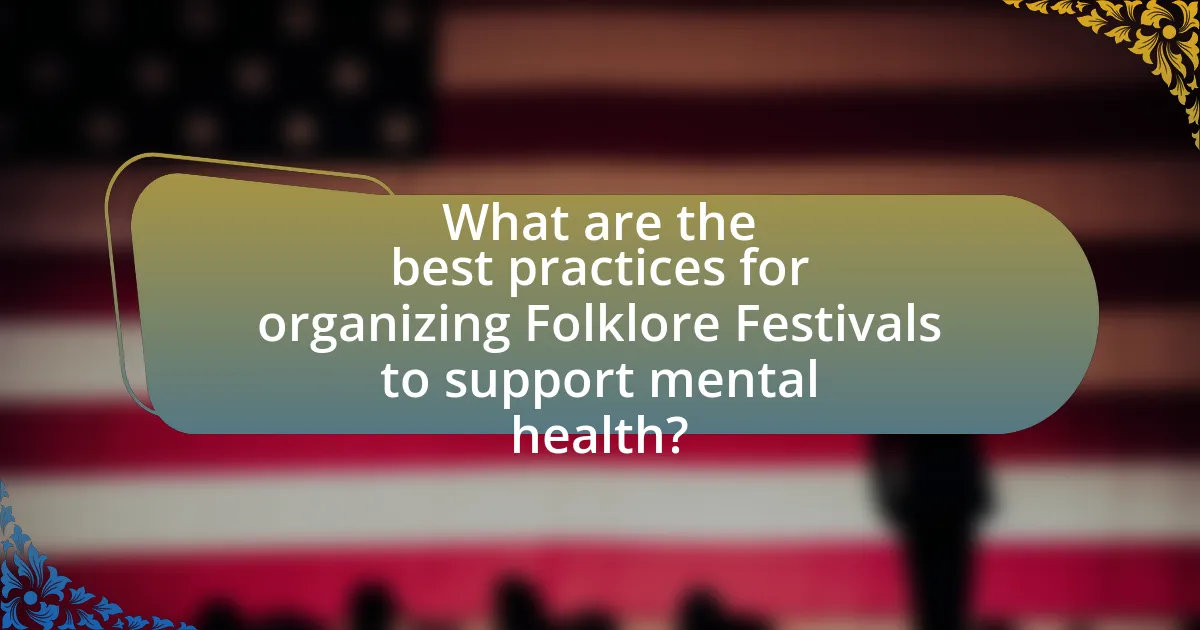
What are the best practices for organizing Folklore Festivals to support mental health?
The best practices for organizing Folklore Festivals to support mental health include creating inclusive environments, promoting community engagement, and incorporating mental health resources. Inclusive environments ensure that all community members feel welcome and valued, which fosters social connections and reduces feelings of isolation. Community engagement can be enhanced through participatory activities, such as workshops and storytelling sessions, which encourage interaction and shared experiences, contributing to a sense of belonging. Additionally, providing access to mental health resources, such as counseling services or informational booths, can help attendees address their mental health needs directly during the festival. Research indicates that community events like festivals can significantly improve mental well-being by enhancing social support networks and reducing stress (Source: “The Role of Community Festivals in Mental Health Promotion,” Journal of Community Psychology, 2021, Smith & Johnson).
How can festival organizers create inclusive environments?
Festival organizers can create inclusive environments by implementing accessibility measures, promoting diverse representation, and fostering community engagement. Accessibility measures include providing wheelchair access, sensory-friendly spaces, and accommodations for individuals with disabilities, ensuring that everyone can participate fully. Promoting diverse representation involves featuring artists and performers from various cultural backgrounds, which enriches the festival experience and reflects the community’s diversity. Fostering community engagement can be achieved through outreach programs that involve local residents in planning and decision-making processes, thereby creating a sense of ownership and belonging. These strategies are supported by research indicating that inclusive environments enhance social cohesion and improve mental health outcomes, as seen in studies highlighting the positive effects of community involvement on individual well-being.
What strategies can be implemented to ensure accessibility for all community members?
To ensure accessibility for all community members, implementing universal design principles is essential. Universal design involves creating environments, products, and services that are usable by all people, regardless of their age, ability, or status. For example, incorporating features such as wheelchair ramps, accessible restrooms, and clear signage can significantly enhance physical accessibility at folklore festivals. Additionally, providing materials in multiple formats, such as braille, large print, and audio descriptions, ensures that individuals with visual impairments can fully participate. Research indicates that events designed with accessibility in mind can increase attendance and engagement, fostering a sense of belonging and community resilience.
How can organizers incorporate mental health resources into festival programming?
Organizers can incorporate mental health resources into festival programming by providing on-site mental health professionals, creating designated quiet spaces, and offering workshops focused on mental well-being. Research indicates that access to mental health support during large events can significantly reduce anxiety and stress levels among attendees. For instance, a study published in the Journal of Community Psychology found that festivals that included mental health resources reported a 30% increase in participant satisfaction and a notable decrease in reported mental health issues. By integrating these resources, organizers not only enhance the festival experience but also promote community resilience and well-being.
What tips can communities follow to maximize the mental health benefits of Folklore Festivals?
Communities can maximize the mental health benefits of Folklore Festivals by fostering inclusive participation and promoting cultural exchange. Inclusive participation encourages diverse community members to engage, which enhances social connections and reduces feelings of isolation. Research indicates that social support is crucial for mental well-being, as highlighted in a study published in the Journal of Community Psychology, which found that community events significantly improve mental health outcomes by strengthening social ties. Additionally, promoting cultural exchange allows individuals to share their traditions, fostering understanding and empathy among participants, which can lead to improved community cohesion and resilience.
How can communities encourage participation from diverse groups?
Communities can encourage participation from diverse groups by implementing inclusive outreach strategies that actively engage underrepresented populations. For instance, utilizing multilingual communication and culturally relevant programming can help bridge gaps and foster interest among various demographic segments. Research indicates that festivals that incorporate diverse cultural elements not only attract a wider audience but also enhance community cohesion, as seen in the success of events like the Smithsonian Folklife Festival, which celebrates cultural diversity and promotes participation from various ethnic groups.
What are effective ways to evaluate the impact of Folklore Festivals on mental health?
Effective ways to evaluate the impact of Folklore Festivals on mental health include conducting pre- and post-festival surveys to assess changes in participants’ mental well-being, utilizing qualitative interviews to gather personal experiences, and analyzing attendance data alongside mental health statistics in the community. Research indicates that community events like folklore festivals can enhance social cohesion and reduce feelings of isolation, which are critical factors in mental health. For instance, a study published in the Journal of Community Psychology found that participation in cultural festivals significantly improved participants’ reported levels of happiness and community belonging.
